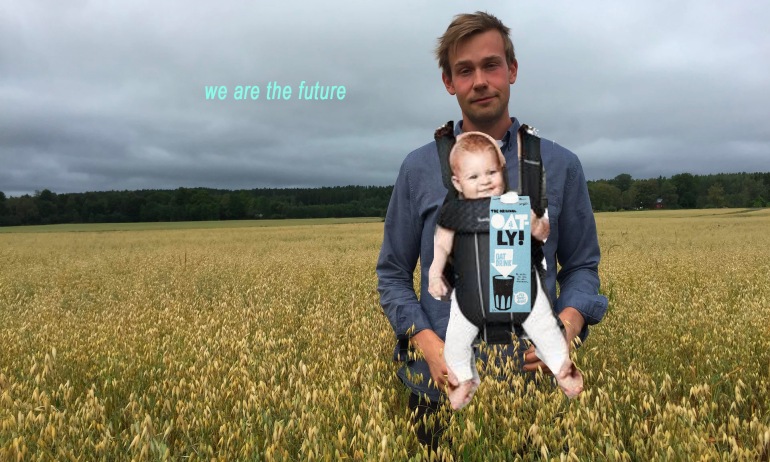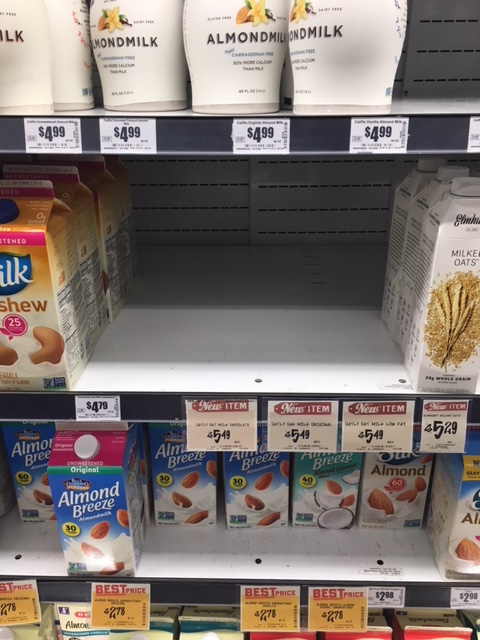This is an article about Oatly: a tasty & dairy-free oat milk.
Porridge.blog heartily endorses the Oatly oat drink; we are oatmeal connoisseurs, and Oatly is essentially oatmeal milk. Oatly feels cozy like porridge does, it comes in chocolate flavor, and we choose it over dairy milk when we have the chance. We got in touch with Oatly and were lucky enough to ask them some questions about the company’s values, goals, and thoughts on living a sustainable lifestyle.
Eating your ethics
We’re in a moment of specialty diets and niche grocery stores, amidst a renaissance of foodie culture. It’s clear that eating, that most human act of survival, is incredibly personal. Every bite is a vote – if you are what you eat, what do you value enough to buy and put in your body? But due to the rise of industrialized and processed foods in the last century, eating according to one’s ethics has gotten increasingly complicated. For the first time in human history, we know what the package of our preferred brand of milk looks like, but we don’t necessarily know where the farm is, or the production process that brought the carton to our grocery store.
Say you want to do your part to combat industrial food processes that tax the environment. The dairy and meat industries are some of the largest producers of greenhouse gases. While combating climate change requires collective action, most governments don’t spend money on messaging and legislating food choices that would reduce emissions and water, energy, and land use. If you went to public school in the US, for example, you probably received milk in your school lunches. You were taught by either the food pyramid, or My Plate, as well as Cheerio’s commercials, that milk is part of a balanced breakfast. What you weren’t taught is that the dairy and cattle industries are some of the most powerful lobbies in Washington, and so what’s good for state dairy industries becomes good for the country, even though scientific evidence about nutrition and sustainable agriculture might suggest otherwise. For better or worse, then, in most capitalist countries, US included, political change falls on the shoulders of businesses.
No one needs another article telling them that Scandinavia is doing something progressive, but here is a fact: the Nordic governments have one of the most dedicated sustainability policies in the world, much of it related to agriculture and food production. In 2004, the leading chefs of the Nordic region got together and wrote the New Nordic Food manifesto, which quickly gained high praise in the culinary world. The chefs called for a revolution in modern food systems and pledged: to Cook with local and seasonal ingredients, to Cook healthy food that has been respectfully sourced, and to Cook with more plants. The manifesto is hosted on the Nordic political co-operative’s government website. Most people in Scandinavia, it seems, are onboard with eating a “flexitarian” diet. But that being said, they’re not about to give up mjölk (milk) – the creamy foundation of Nordic traditional cuisine.

Enter Oat Milk
This is the premise of Oatly, according to their creative director, John Schoolcraft. He writes all of the text on the cartons and website, and is effectively the voice of Oatly:
We know that 14.5 % of greenhouse gases are from the dairy and milk industry. There is something that we can start to cut down a little. And that will have great impact on the world over time […] If you’re taking oats, and you’re running them through the body of a cow before packaging them, there is a more sustainable way of doing it, which is taking the oats and adding some water.
Oatly was invented in Sweden in the 1990s. At the time, there were very limited options for non-dairy milk. Oatly was originally marketed as a lactose free beverage for people who could not drink cow’s milk. In 2013, Schoolcraft led the company’s rebrand, and transformed Oatly from a non-dairy milk (a product) into a sustainable nutritional brand (a lifestyle defined by consumer choices). “We don’t really work with target groups at all, but if we did have a target group it would be, like, anyone who cares about what they put into their body, and anyone who cares about there being a planet in the future,” said Schoolcraft.
Oatly is not deliberately designed for the progressive cosmopolitan socialist, per say, but it’s definitely appealing to someone who knows about and appreciates good design and who enjoys indulgent treats like lattes, ice cream, and creamy cooking, but also cares about health. The packaging is a nice recycled cardboard brown, the lettering is funky, and the text on the side emphasizes environmentalism and universal rights. Schoolcraft describes Oatly’s messaging as a PSA from the future. The cartons say things like “hello future Oat Milk Drinker,” “like milk, but made for humans,” and “Know your [consumer] rights!” The text proved too radical for some – Oatly was sued! in 2014 by the Swedish Dairy Industry for making slanderous claims about milk. (A similar case happened in 2016 in the US over the right to use the word “milk”). The industry won the legal battle, but Oatly won the public opinion war – the company’s popularity exploded from the free advertising. Today, Oatly is the leading dairy alternative in Scandinavia, where a mind boggling variety of oat creams, ice creams, and oat yogurts are available, and the company is quickly gaining clout in US, European, and Chinese markets.

A Plant-Based Revolution
Historically vegan foods have had to overcome popular belief that plant-based diets are a compromise – less meat, less delicious, substitution. Oatly’s environmental mission depends on a massive decrease in demand for cow’s milk, which means that many people will have to switch to a more plant-based lifestyle. This means mothers buying the cheapest gallon of milk at the grocery store to feed their children breakfast, staunch beefy carnivores, and more. A foodie, for example, might agree with plant-based eating on principle, but not follow that practice because they want to eat the food of the people, and cultures have been cooking with meat and dairy since the beginning of human history. The challenge for chefs and brands like Oatly is to change people’s expectations of what eating plants can taste like, and convince them that this change does not need to be a sacrifice.
“In order to get a really huge plant-based revolution when it comes to cooking, you’re going to need the best chefs in the world to start cooking a lot more plant-based,” says Schoolcraft. This idea of a trickle down is how most culture, from fashion to food, is transmitted from industry visionaries to the everyday consumer. For example, David Chang is a trendsetting chef from LA, who is known at the moment for his hit Netflix series, Ugly Delicious. Chang was the first chef to serve the Impossible Burger, a vegan hamburger patty that appears to bleed like real meat, on his menu in 2016. Restaurants around the country followed his lead and now people in most cities can find a neighborhood restaurant that does their own take on the Impossible Burger, or they could visit the national fast food chain White Castle, which sells Impossible Sliders for $1.99.
“We Promise to be a Good Company”
A sustainable lifestyle is more than diet, though. One of Oatly’s core values, lauded on the side of their carton and on their website, is to be a “good company.” They define this as transparent, healthy, and sustainable. Oatly’s website tells consumers where all of the ingredients are sourced from and why they are added. If you’re curious, you can learn that dipotassium phosphate prevents the oat milk from curdling when mixed with hot liquids, and it is sourced from Germany.
“We want people to question where their food comes from and what it takes to make it,” says Mike Messersmith, general manager of Oatly US. “There are all sorts of reasons why people buy products, so we try to appeal to less around age, gender, location, income level, a lot of those traditional metrics that companies use to define their demographics, and we try to appeal more to like a mindset I think, to people that are asking questions, and challenging conventions, and status quo. If we can support that with a kind of somewhat boring but a little bit subversive oat milk brand, by getting them to like, ‘well Oatly is showcasing all their ingredients online, or telling me things on their website like why I might not want to buy it, well why don’t these other companies tell me those things?’”

One of the most famous advertising campaigns of the last generation is Goodby Silverstein & Partners’ television campaign for California Dairy – “Got Milk?” It’s ingenious psychology that equates consumers with Pavlov’s Dog. Ring the bell, bring out a tray of cookies or a peanut butter sandwich, and anyone who’s seen the spots is salivating for a cold glass of 2%. I asked if Oatly has considered marketing to children, since doing so has brought milk and cereal brands a lot of guerilla success. The response was an emphatic no – “People hate it when they can feel a company trying to sell them something,” said Messersmith. Schoolcraft continued, “One of our unwritten rules is like, don’t sell.”
In this digital world of constant targeted advertising and consumer self awareness, saying that you’re not selling is pretty brilliant marketing. But that’s sort of the point. “Business is such an incredible engine for change in this world,” said Messersmith. “I truly believe that, that a great product and a sustainability oriented business can be a mechanism to create scaled change.” Oatly is growing in scale quickly. It isn’t just a sustainable milk – it’s a lifestyle brand. To drink Oatly is to think about where your food is coming from, to eat more plants, to recycle your carton. As they grow, we hope that they stay true to their quirky self and their mission to save the world, their original oat drink. Go forth and conquer, Oatly. You speak of a beautiful future of healthy neighbors sharing a healthy planet.



